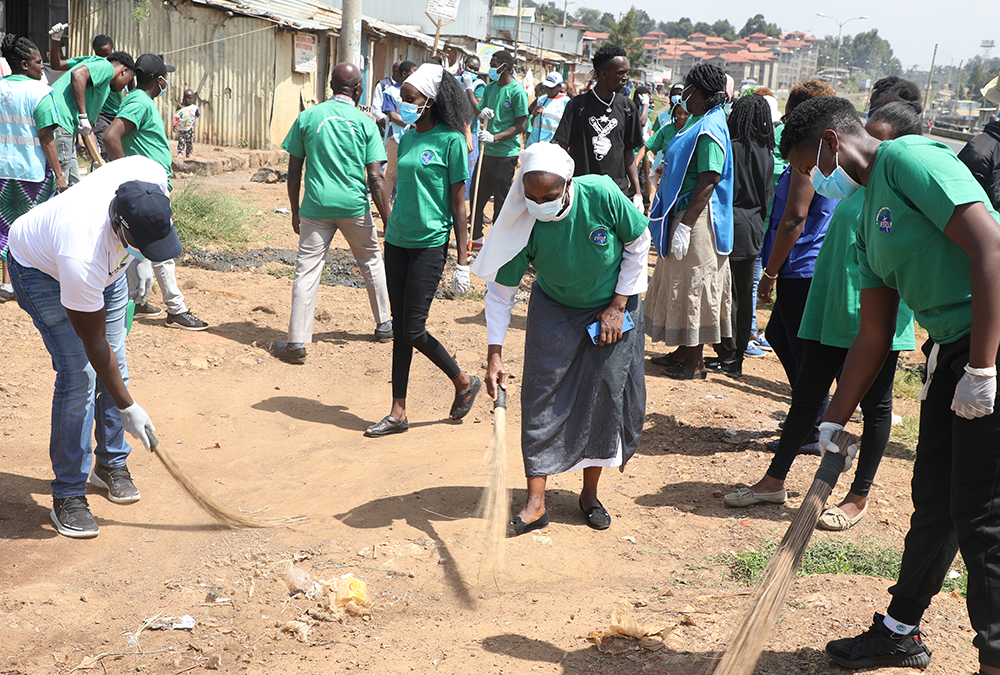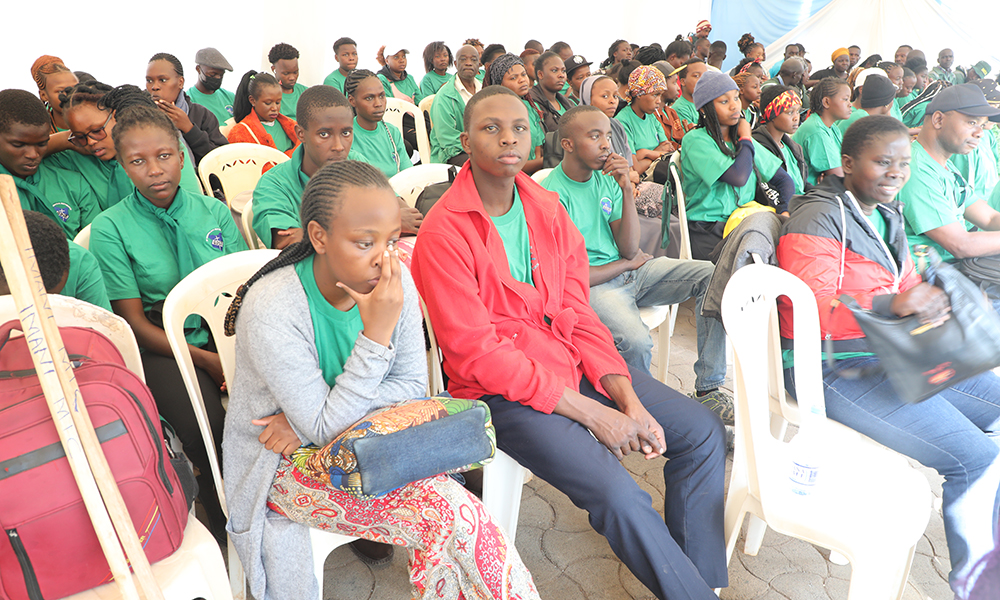
Sr. Celine Makario of the Sisters of Mary Kakamega leads a collective of youth from different technical training institutions in an environmental community service exercise that involved garbage collection, tree planting and cleaning efforts at the Raila Village in Nairobi’s largest slum, Kibera. (Wycliff Peter Oundo)
As the climate crisis affects Kenya and its GDP, the Association of Sisterhoods of Kenya, or AOSK, are working toward training hundreds of youth on environmental awareness.
Mobilizing government representatives, sisters, and technical training institutions to recruit and train hundreds of youth, the association is empowering young people with their Sisters' Led Youth Empowerment Initiative, or AOSK-SLYI.
Since its launch in 2020 to combat the many challenges facing youth — such as unemployment and substance and psychological abuse — the Sisters' Led Youth Empowerment Initiative has impacted more than 6,000 youth through its psychosocial empowerment forums.
Now, the sisters "aim to leverage the AOSK-SLYI's networks towards environmental stewardship by the youth, who are tomorrow's climate ambassadors," Sr. Mercy Mwayi, the program manager, told GSR.
This environmental conservation project partners with relevant stakeholders and government ministries and currently has a growing presence in 12 technical institutions, with the hopes of eventually reaching 50 institutions across 26 counties, said Mwayi, a Franciscan Sister of St. Joseph.
In this program, youth are taught how to grow and nurture trees for climate and socioeconomic benefits; AOSK-SLYI's target is to plant 1,000 trees annually, she added.

Sr. Mercy Mwayi, program manager of the Sisters' Led Youth Empowerment Initiative of the Association of Sisterhoods of Kenya, addresses a symposium of ministry officials, Catholic technical and vocational institutions, and hundreds of youth attendees who had gathered at St. Charles Lwanga Vocational Training Institute in Kibera, Nairobi, for the forum of the initiative's environmental conservation program. (Wycliff Peter Oundo)
Earlier this year, Kenya was ravaged by flash floods attributed to climate change, whose impact on the country's weather patterns resulted in the displacement of nearly 282,000 people and more than 200 deaths, according to the United Nations Office for the Coordination of Humanitarian Affairs. In 2023, the World Bank forecasted that Kenya's GDP could see a decline north of 7% by 2050 due to climate inaction.
The pro-climate program, which launched in 2022, is embedded in AOSK-SLYI's Catholic vocational centers and technical training institutions managed by sisters through environmental clubs. It marshals awareness to more youth through its yearly climate conservation training seminars. The one-week symposiums (usually held around June 5-15), pay homage to different World Environment Day themes, with this year's theme focused on land restoration, desertification, and drought resilience.

Hundreds of youth attended the AOSK-SLYI's environmental conservation program's forum, at the St. Charles Lwanga Vocational Training Institute in Kibera, Nairobi. Sisters and youth from 12 technical training institutions were trained on various environmental conservation measures, including technical skills as future climate activists. (Wycliff Peter Oundo)
"This year, we are facilitating climate action awareness in line with the UNEP World Environment Day theme and planting around 126 trees, and coordinating community service activities such as garbage collection, and beautification of communities like the Raila Village in Kibera," Nairobi's largest slum, Mwayi said.
Onboarding hundreds of youth attendees, the environmental program this year culminated in a seminar and climate conservation activities at the St. Charles Lwanga Vocational Training Institute in Kibera. The Sisters' Led Youth Empowerment Initiative partnered with the Ministry of Youth Affairs, Creative Economy and Sports; Kenya Forest Service; Kenya Forest Research Institute, or KEFRI, and Catholic technical and vocational institutions from the Nairobi Archdiocese.
Advertisement
Sisters and ministry officials trained the youth on various environmental practices like recycling and soil management, while emphasizing positive climate action and economically viable conservation methods (reforestation of indigenous trees like the blue gum for raw materials, for example). Young people were also educated on the role of technology in environmental conservation through the "Jaza Miti" application, which monitors reforestation efforts in Kenya.
"We have been working with sisters to reach out to communities and sensitize our grassroots on climate action," Samson Mogire, a KEFRI dissemination officer, told GSR. "This partnership is especially impactful in our joint ministries efforts to include the youth in climate activism. I am grateful to the sisters and urge the church to continue its efforts in environmental conservation."







